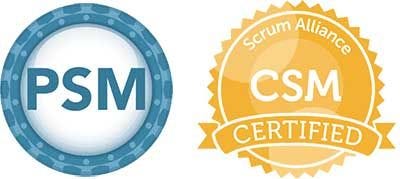Reading time: 3 minutes
So you're interested in becoming a Scrum Master but don't know where to start.
Here's my advice.
There are certification exams you can take called Certified Scrum Master (CSM) or Professional Scrum Master (PSM-1). You have to pay to take the exam even if you don't pass.
Are they worth it? Well... no, but also yes.
No, because passing the CSM or the PSM-1 does not give you any real idea what being a Scrum Master is like, nor does it really qualify you to do the job.
I've seen another Scrum Master on LinkedIn put it nicely, saying getting certified makes you qualified to start thinking about Scrum.
But also yes, because companies that are hiring Scrum Masters often overvalue these certifications. If you don't have one, you might get filtered out and not make it to the interview stage.
So if you're at a company that already has Scrum Masters and it's a position you could try to transfer into - don't bother with the certification. But if you're not, you might need it to get hired.
You can also pay more to take training courses to prepare you for them. The training courses are usually 2 days long, and they're led by other Scrum Masters who have gotten a special Trainer certification.
Are these worth it?
In my opinion, and with all due respect to the trainers, not really. They might be worth it for more advanced certifications, but for the basic ones I think you can pass the exam without taking one of these classes.
Here's a very simple study plan:
Read the Scrum Guide today. It only takes about 20 minutes. Then rest for 20 minutes, and go back and read it again.
After that, read the Scrum Guide again everyday, at least once per day for at least 30 days. If you don't realize something new each time you read it, then you read it too fast and weren't paying attention.
On the scrum.org site there is a practice test called the Scrum Open. Take this test at least once every day, until you can consistently pass it with a 100% score in 5 minutes or less.
At this point, you could take the PSM-1 and pass. Don't forget it's an open-book test.
As a note, the CSM requires the training class in order to even be allowed to take the exam, so you can't shortcut it in the same way.
Yes, you should read other things about Scrum and Agile as well. But remember that for this certification exam, the Scrum Guide is the final word, so don't confuse other people's opinions with the actual text of the Scrum Guide.
After you're certified, you still have a host of questions to answer, like...
- How do I present my skills on my resume?
- How do I prepare for interviews?
- How do I get experience before I get hired?
- How do I differentiate myself from other candidates?
These are the questions everyone is trying to answer.
My take on some of this can be found here:
Subscribe to my newsletter to get it sent directly to your email inbox every week, and connect with me on LinkedIn at https://linkedin.com/in/scrumify.
Whenever you're ready, here's how I can help:
I've created a framework for Personal Agility called Scrumify. Click this link to read it.
Grab a copy of the Scrumify Workbook, a low-cost Scrum Master proxy to help you use the framework.
If you're trying to Scrumify something big in your life and want to work with me, I can be your Personal Scrum Master. Contact me here.
I occasionally host cohort programs for aspiring Scrum Masters looking for their first experience on a Scrum Team. Click here to sign up for the next one.





